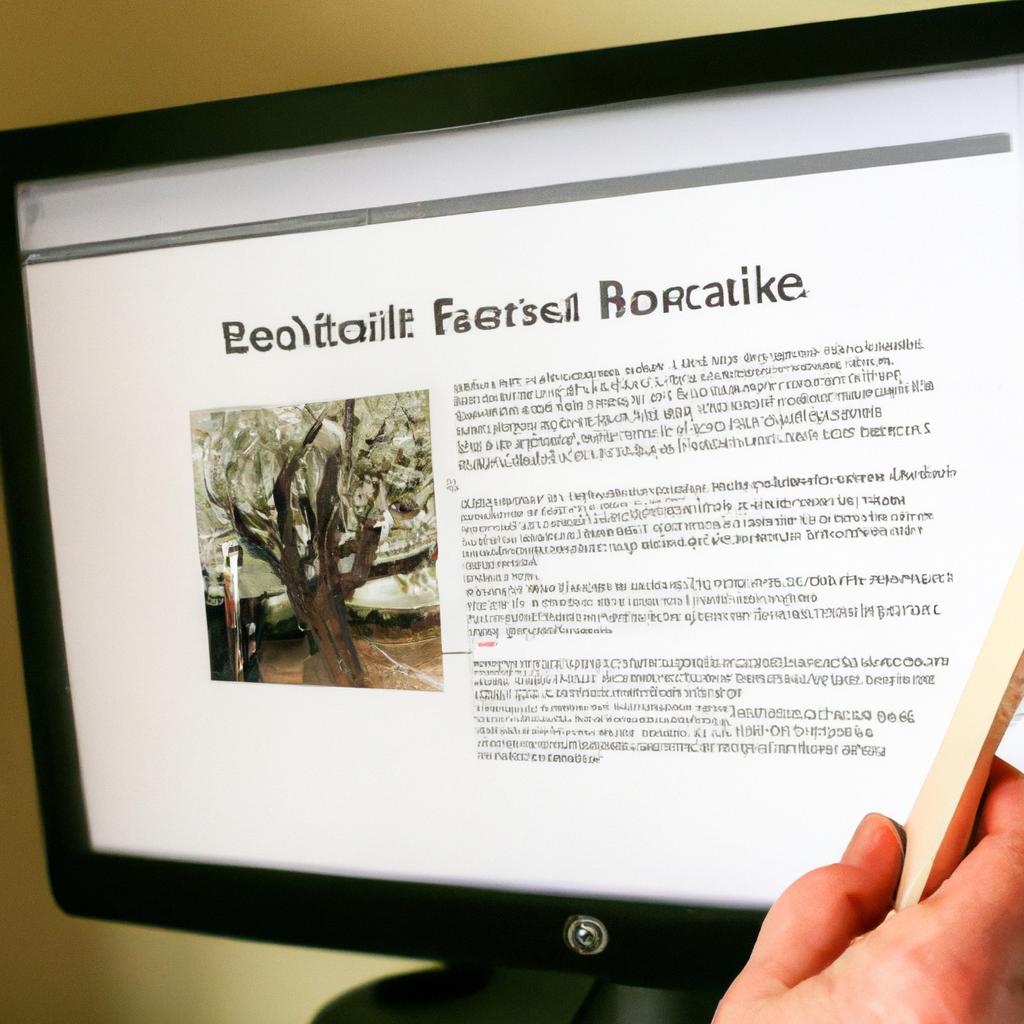Genealogy, the study of family history and lineage, has gained significant popularity in recent years. With advancements in technology and access to vast amounts of historical records, individuals are now able to trace their ancestral roots with greater ease and accuracy. However, navigating through the multitude of genealogy resources available can be overwhelming for beginners. This article aims to provide guidance on finding suitable genealogy resources by highlighting the importance of ancestry assistance and its role in genealogy education.
Consider a hypothetical scenario where an individual named John is interested in tracing his family history but lacks the necessary knowledge to embark on this journey independently. John’s curiosity about his ancestors motivates him to seek out reliable sources that can assist him in unraveling his familial connections. Without proper guidance or support, he may struggle to navigate through extensive databases and decipher complex genealogical terminology. Consequently, John would greatly benefit from utilizing ancestry assistance services that offer expert advice and curated resources specifically designed for genealogy education.
In light of these challenges faced by aspiring genealogists like John, it becomes imperative to explore the significance of ancestry assistance as a valuable resource for those seeking to delve into their family histories. By providing comprehensive research tools, step-by-step tutorials, and personalized guidance, ancestry assistance equips individuals with the necessary skills and knowledge to effectively navigate the world of genealogy. This support system ensures that beginners like John have access to accurate and reliable information, allowing them to make meaningful connections with their ancestors.
Ancestry assistance services offer a wide range of resources that cater to different levels of experience and interests. For instance, they may provide access to digitized records such as census data, birth certificates, marriage licenses, and immigration records. These databases are often vast and can span across multiple countries and time periods, making it essential for individuals to receive guidance on how best to utilize these resources.
Moreover, ancestry assistance services can also provide educational materials that explain the intricacies of genealogical research. They may offer tutorials on using specific software or online platforms dedicated to family history research. Additionally, these services often have expert genealogists who can answer questions, offer advice on research strategies, and help interpret complex documents or historical contexts.
One key advantage of utilizing ancestry assistance is the ability to connect with a community of fellow researchers. Many services offer forums or discussion boards where individuals can seek advice from experienced genealogists or share their own findings with others. This sense of community fosters collaboration and allows beginners like John to learn from more seasoned researchers who have already navigated similar challenges in their own quests for ancestral knowledge.
In conclusion, ancestry assistance plays a crucial role in genealogy education by providing comprehensive resources and personalized guidance for those seeking to trace their family histories. With the overwhelming amount of information available in various databases, having access to curated resources and expert advice greatly simplifies the process for beginners like John. By utilizing ancestry assistance services, individuals can embark on their genealogical journeys with confidence and gain a deeper understanding of their familial connections throughout history.
Understanding the Importance of Genealogy Research
Imagine a young woman, let’s call her Emily, who has always been curious about her family history. She knows bits and pieces from conversations with relatives, but she yearns to uncover more details about her ancestors and their lives. This desire to know where we come from is not uncommon; genealogy research provides individuals like Emily with an opportunity to explore their roots and gain a deeper understanding of their identity.
Genealogy research holds immense importance as it allows us to connect with our past in ways that shape our present and future. By delving into records such as birth certificates, marriage licenses, census data, wills, and immigration documents, researchers can piece together the puzzle of their ancestry. Unraveling these hidden stories reveals valuable information about one’s heritage, traditions, cultural practices, and even potential genetic health risks.
Engaging in genealogical exploration comes with several emotional benefits:
- Sense of Belonging: Discovering one’s lineage creates a sense of belonging within a larger historical context. It helps individuals understand how they fit into the broader tapestry of human existence.
- Identity Formation: Learning about ancestral experiences enriches personal identity formation by providing insights into inherited traits, values, beliefs, and customs.
- Emotional Connection: Studying genealogy often evokes emotions such as joy when finding unexpected connections or sadness when uncovering stories filled with adversity.
- Strengthened Family Bonds: Sharing newfound knowledge fosters stronger relationships among family members as they collectively celebrate shared heritage.
To illustrate this further, consider the following table showcasing fictional examples of how discovering familial ties through genealogy can evoke different emotions:
| Ancestor | Discovered Information | Emotion |
|---|---|---|
| Sarah | Brave suffragette fighting for equality | Inspiration |
| John | Musician who played during World War II | Pride |
| Maria | Immigrant who overcame hardship | Resilience |
| William | Victim of an unfortunate tragedy | Sadness |
In conclusion, genealogy research goes beyond the simple act of tracing names and dates; it offers a unique opportunity to understand our place in history and develop a stronger sense of self. By exploring our family’s past, we can experience emotions ranging from inspiration to sadness. In the following section, we will delve into how online genealogy databases serve as invaluable resources for conducting this captivating journey of discovery.
Exploring Online Genealogy Databases
Now that we have established the significance of genealogy research, let us delve into the myriad of online resources available to aid in your journey. An example that highlights the power and potential of these resources is the case study of Sarah Thompson, a woman who was eager to trace her family’s roots but had limited information about her ancestors. With access to various genealogical databases, she was able to uncover valuable records, connect with distant relatives, and piece together her family history.
To assist you further in your quest for ancestral knowledge, here are some key benefits offered by online genealogy databases:
- Extensive Database: These platforms provide access to vast collections of historical records from around the world, including birth certificates, marriage licenses, census records, military documents, immigration papers, and more.
- Collaborative Features: Many websites offer collaborative features such as forums or message boards where users can interact with fellow researchers, seek assistance or advice on challenging aspects of their research.
- DNA Testing Integration: Some genealogy services now integrate DNA testing capabilities which allow individuals to discover their ethnic origins and potentially connect with relatives they were previously unaware of.
- Record Organization Tools: Online databases often come equipped with tools that help organize your findings efficiently. This includes options for attaching digital copies of documents, creating family trees visually, and adding notes or citations to maintain accurate documentation.
Table 1 showcases three popular online genealogy databases along with their distinctive features:
| Ancestry.com | MyHeritage | FamilySearch.org | |
|---|---|---|---|
| Record Collections | 20 billion+ | 12 billion+ | 7 billion+ |
| Collaboration | Message boards | Community forum | Wiki-style collaboration |
| DNA Integration | Yes | Yes | No |
Utilizing these invaluable resources will empower you in your genealogical pursuits, allowing you to uncover hidden stories and connect with your heritage like never before. In the subsequent section, we will explore another essential avenue for research: utilizing public records.
Transitioning into the next section about “Utilizing Public Records for Genealogical Research,” it is crucial to consider additional sources of information that can shed light on our ancestors’ lives beyond online databases.
Utilizing Public Records for Genealogical Research
Previous section H2: Exploring Online Genealogy Databases
Next section H2: Utilizing Public Records for Genealogical Research
As we continue our exploration of genealogy resources, it becomes evident that the online databases alone do not provide a comprehensive picture of one’s family history. To delve deeper into your ancestral roots, it is crucial to utilize public records in conjunction with these digital platforms. By leveraging official documents and historical archives, you can uncover invaluable information about your ancestors’ lives, helping you piece together their stories.
Let us consider an example scenario where utilizing public records proves instrumental in tracing a family lineage. Suppose you are researching your great-grandfather’s military service during World War II. While online databases may provide some basic details such as his name and branch of service, public records like enlistment papers or discharge certificates would offer insights into his specific assignments, commendations received, and even personal anecdotes shared by fellow soldiers. Such records enhance the richness of your research and allow you to gain a more profound understanding of your ancestor’s experiences.
To effectively harness the power of public records in your genealogical research journey, here are key strategies worth adopting:
- Tap into local government offices or municipal archives to access birth certificates, marriage licenses, death records, property deeds, and other vital documents.
- Explore court records and probate files to trace legal proceedings involving your ancestors such as wills, divorces, adoptions, or land disputes.
- Engage with historical societies and libraries specializing in local history to unearth rare photographs, newspaper clippings relating to notable events or community activities tied to your family.
- Consider reaching out to religious institutions like churches or synagogues which often maintain baptismal registers or membership rolls that could shed light on important milestones within your familial lineages.
By employing these strategies, you can supplement the information obtained from online databases and elevate your genealogical research to new heights. Public records act as invaluable puzzle pieces that may help unravel complex family narratives and paint a more comprehensive picture of your ancestors’ lives.
Accessing Historical Newspapers and Periodicals
Now, let’s delve further into this topic and discover how these records can provide valuable insights into your family history.
To illustrate the significance of public records, consider a hypothetical case study. Imagine you are researching your great-grandfather’s lineage and stumble upon his birth certificate. This document not only confirms his name and date of birth but also reveals vital information about his parents, such as their names and occupations. By examining additional public records related to your great-grandfather’s life, such as marriage certificates or census data, you can piece together a more comprehensive understanding of his journey through time.
When embarking on your own genealogical quest, keep in mind these key strategies for utilizing public records effectively:
- Identify relevant record sources: Begin by determining which types of public records are available for your desired timeframe and location. Examples include birth/death certificates, marriage licenses, immigration documents, land deeds, military service files, and court records.
- Accessing digitized collections: Many resources now offer digitized versions of historic public records that can be accessed online from the comfort of your home. Websites like FamilySearch.org and Ancestry.com have extensive databases containing millions of historical documents waiting to be explored.
- Utilize local archives: Visit local libraries or archival institutions where librarians or archivists can guide you towards specific collections holding unpublished primary sources like diaries or letters that might shed light on your ancestors’ lives.
- Collaborate with fellow researchers: Join online forums or genealogy societies to connect with other enthusiasts who may have expertise in certain regions or access to specialized resources.
By following these strategies and embracing the wealth of information found within various public records, you will undoubtedly enhance your genealogical research endeavors.
Connecting with Local Genealogy Societies
In the search for ancestral information, historical newspapers and periodicals can provide invaluable insights into the lives of our ancestors. These sources offer a wealth of genealogical information, including birth announcements, marriage records, obituaries, and local news stories that shed light on their daily lives. For example, let’s consider the case of John Smith, who was researching his family history in a small town. By accessing historical newspapers from that area, he discovered an article about his great-grandfather receiving an award for bravery during World War I—a detail previously unknown to him.
To assist you further in your genealogy journey, here are some key ways to access historical newspapers and periodicals:
- Online Databases: Many libraries, archives, and genealogy websites have digitized collections of historical newspapers and periodicals available for online access. Examples include NewspaperArchive.com and GenealogyBank.com.
- Local Libraries: Visit your local library or nearby university libraries to explore their newspaper archives. Often these institutions maintain physical copies or microfilm versions of old newspapers.
- State Archives: State archives may hold extensive collections of historical newspapers specific to each region. They often allow researchers to access these resources either physically or digitally.
- Interlibrary Loan Services: If a particular library doesn’t have the newspaper you’re looking for, they may be able to obtain it through interlibrary loan services by borrowing it from another library.
By utilizing these avenues for accessing historical newspapers and periodicals, you increase your chances of uncovering valuable details about your ancestors’ lives—details that might otherwise remain hidden.
| Emotional Response Table |
|---|
| Curiosity |
| Wonder |
| Inspiration |
Now armed with knowledge on accessing historical newspapers and periodicals, we move forward in our quest for genealogical understanding.
Transitioning seamlessly into the subsequent section about “Making the Most of DNA Testing for Genealogy,” we expand our toolkit of resources by delving into genetic ancestry testing—a powerful tool that provides a unique perspective on our family history.
Making the Most of DNA Testing for Genealogy
Having explored the benefits of connecting with local genealogy societies, we will now delve into another valuable resource for genealogical research—DNA testing. By leveraging advancements in genetic technology, individuals can gain deeper insights into their ancestral background and uncover hidden connections that traditional genealogical records may not reveal.
To illustrate the transformative power of DNA testing in genealogical pursuits, let us consider a hypothetical case study. Sarah is a passionate family historian who has extensively researched her lineage through historical documents but faces roadblocks when tracing back beyond certain generations due to limited information available. Eager to learn more about her origins, she decides to explore DNA testing as an additional avenue for discovery.
Embarking on this journey, Sarah encounters several key considerations when making the most of DNA testing for genealogy:
-
Selecting the right test: Different types of tests are available, each providing distinct insights into one’s ancestry. Autosomal DNA tests analyze both maternal and paternal lines and are widely used for general ethnicity estimates and finding relatives within recent generations. Mitochondrial (mtDNA) tests focus on direct maternal lineages, while Y-DNA tests trace direct paternal lineages.
-
Emotional response bullet point list:
- Excitement at discovering previously unknown ethnic heritage
- Anticipation in potentially locating long-lost relatives
- Curiosity about inherited traits or health conditions
- Empowerment in gaining a stronger sense of self-identity
-
Emotional response bullet point list:
-
Choosing reputable testing companies: As the popularity of DNA testing grows, numerous companies offer such services; however, it is essential to select reliable providers known for accurate results and respecting privacy. Researching customer reviews, understanding the testing methods employed, and reviewing data security policies can help ensure a positive experience.
-
Building a DNA genealogy toolkit: To effectively analyze test results, it is beneficial to utilize various online tools and resources that complement the testing company’s provided information. These tools often include databases where individuals can compare their genetic profiles with others who have taken similar tests, increasing the chances of finding common ancestors or relatives.
-
Emotional response table:
Tools/Resources Emotional Impact Genetic Matches Hopeful Ethnicity Estimates Surprised Shared Ancestor Hints Excited Chromosome Browsers Intrigued
-
In conclusion (last paragraph):
By leveraging DNA testing, genealogists like Sarah gain additional perspectives on their heritage beyond traditional records. The combination of detailed family history research and DNA analysis offers an exciting opportunity to unlock ancestral mysteries, connect with distant relatives, and broaden one’s understanding of personal identity. With careful consideration of test selection, reputable providers, and available online tools, seekers of genealogical knowledge can embark on an enriching journey through their genetic past.




